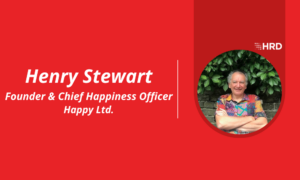Are there really business benefits to employee health assessments?
- 5 Min Read
Businesses are implementing wellbeing strategies to support struggling staff, attract new talent and retain current workers. However Marcus Herbert, Corporate Operations Specialist, Nuffield Health discusses whether there are any benefits to this.
- Author: Marcus Herbert
- Date published: Mar 14, 2019
- Categories

Today, employers are increasingly expected to support their employees’ health and wellbeing needs.
However, organisations need to be equipped with the right information and the right services to build an accurate picture of their workforce’s health and maximise the financial investments made in employee wellbeing.
 Marcus Herbert, Corporate Operations Specialist at Nuffield Health explores the business benefits of health assessments and how data is revolutionising the traditional one-size-fits-all approach.
Marcus Herbert, Corporate Operations Specialist at Nuffield Health explores the business benefits of health assessments and how data is revolutionising the traditional one-size-fits-all approach.
Beating the productivity blues
A recent Deloitte study discovered presenteeism, sickness absence and staff turnover costs UK employers £33-42 billion annually. With statistics like this hitting the headlines, more businesses are increasingly putting preventative health strategies in place.
Responsible companies understand they can help facilitate the right environment for positive health changes through their culture – providing targeted benefits, services and programmes – and effectively communicating these options to their workforce. Carefully designed health checks should focus on high-value care which look to improve outcomes and reduce business costs. For example, sound research evidence demonstrates that detecting early stage bowel cancer is associated with improvements in survival plus lower levels of subsequent physical and psychological disability. Direct health care costs are also lower (because of less complex/invasive treatments) and with less financial burden on individuals, families and employers due to faster recovery and less time off work.
Make yourself stand out
According to CIPD, 97 percent of employers are planning to maintain or increase their benefit spend in the next two years. This is because many businesses report employee benefits continue to play a key role in attracting and retaining the best talent.

Of course, as mentioned earlier, health screening can benefit employers financially, as sick pay can be very expensive. However, there are not only financial business benefits. When it comes to driving a positive company culture, it is fundamentally important to show you are invested in employee wellbeing. Providing health assessments as part of your benefits package demonstrates to staff members both old and new that you value their health and welfare, which, in turn, increases staff morale and boosts confidence in an employer.
Empowering the individual
Knowledge is power and personalised health assessments equip employees with the skills and information to recognise signals of ill health and how to make positive behaviour changes both in and outside the workplace. For example; they keep the employee informed of age and gender-related cancers and illnesses that they may need to be aware of, as they age and the possible symptoms. Health assessments are also customised to the individual, so they can focus on any specific questions or queries the employee may have. The confidential element of health assessments also means staff feel in a safe space to discuss any personal health concerns they may have or ask questions of a qualified medical professional. Not only do employees receive valuable information on health conditions, but they also become more aware of small lifestyle changes they can make, outside the workplace which can make a big difference to individual health.
Organisations offering health assessments as part of their wellbeing strategy are giving individuals the opportunity to gain insight and awareness. This could be enough to elicit positive behaviour changes, which result in improved health outcomes, tangible business benefits, and of course a more meaningful return on investment (ROI).
Making it easy
Encouraging employees to prioritise their health is all well and good, but how can businesses ensure their good intentions do not alienate or patronise staff? One way is to demonstrate from the top down and show their leaders use and champion the business’ own evidence-based health assessments themselves. Companies must strive to normalise conversations about wellbeing and prove the benefits in the self-management of our health. Improved internal communication in the workplace is also essential for promoting involvement. A customised approach is essential to meet the preferences and needs of different generations. This can simply mean being more targeted with your messaging and emphasising the variety of benefits for different demographics.
The rise of data
The integration between health technology and the workplace is evolving rapidly and changing how companies think about and implement wellbeing strategies. A growing number of businesses are now introducing opportunities both for employers and employees to support and promote through digital platforms and apps. At Nuffield Health we recently introduced our new PATH programme, which uses a number of evidence-based mathematical algorithms to determine a person’s risk factors and generate a completely bespoke assessment for them. The data collected is used to drive an organisation’s future wellbeing strategy, increasing its success rate and ROI.
With rapid developments occurring across the health and technology industries, our hope is businesses will understand while one-off health assessments are still beneficial to the individual, the collective data obtained can also inform a more meaningful and intelligent wellbeing strategy.
Businesses who proactively embrace the latest developments and are willing to adapt will see reduced absenteeism, increased staff productivity, retain the very brightest of talent and see more a more meaningful ROI.
About Marcus
Marcus Herbert is a Corporate Operations Specialist at Nuffield Health, the leading provider of corporate wellbeing services in the UK. Marcus works closely with the Professional Head of Physiology and Deputy Medical Director to shape the future of Nuffield Health’s Health Assessment products and digital platforms



